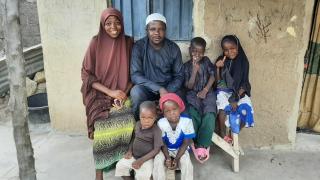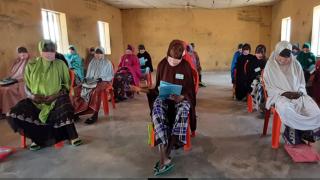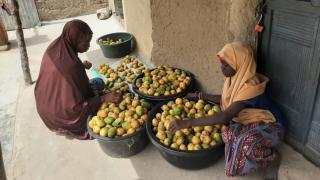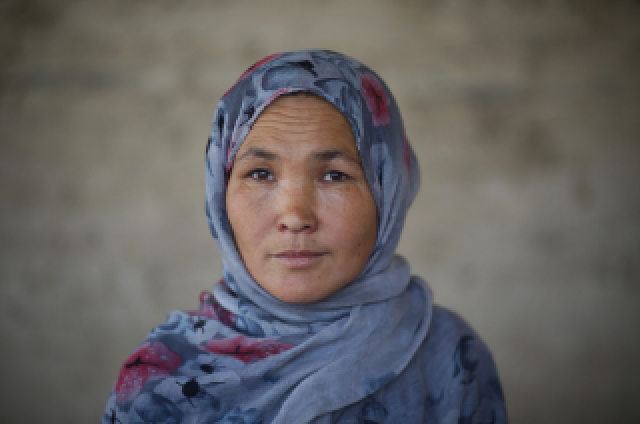Ikilima's story
My name is Ikilima
From instability at home and in her community in northern Nigeria, to finding peace and power: how education helped Ikilima transform her life and support other women
My name is Ikilima. I wish I had gone further in my education, but it was not possible because my parents could not afford to pay for my secondary school, so I got married at 16 instead. Now, I am 30 years old with five children. The first is 13 and the last is two years old.

I can never forget an experience seven years ago. One evening, I was home with my children when we heard so many gunshots simultaneously. Bununu community, my home in northern Nigeria, was thrown into confusion as people began to run in different directions. My husband was not around that evening; I ran away, leaving all my three children. Almost everyone in Bununu fled the community; we ran to Dass community from about 7pm until 2am. No one thought of stopping because the gunshots did not cease; it was like one person started shooting and others just kept picking up where the previous one stopped.
It was only when we gathered in a public school there that I began to look for my children. My phone had fallen while running, and I did not even realise. It was brought to me by a neighbour who picked it up when she saw it fall. The next day, my husband called, and together we started to look for our children.
My neighbour a few houses away, who had heard their cries after I fled home, took them with her and ran to Dass community. She almost beat me up when she saw me, asking what kind of an irresponsible mother I was. I cried and begged her to forgive me because I had never heard those kinds of gunshots.
Later, we heard that the gunshots were fired by members of the insurgent Boko Haram group who were en route to Tafawa Balewa.
They kept firing gunshots sporadically to ensure their road was clear. We went home after the place became calm, only to hear there was tension in Tafawa Balewa and some people were killed.
I had no business or source of income generation. I sold things whenever I could raise any little money, and before long, I would have used my capital to take care of my family’s needs and be left with nothing to fall back on until another time when I was able to raise another sum of money.
I joined the Women for Women International programme after hearing about the training that participants receive during the 12 months.

When I got the information about Women for Women International, I was having difficulties in my marriage; that was when my husband was told that having a cordial and loving relationship with me would lead to my becoming disrespectful to him.
My friend told me about the programme and said that I would be helped to repair the strained relationship in my family, and I would be taught how to negotiate with him so that we could have discussions as husband and wife.
I was determined to join because I needed peace in my home at the time.
I have learned to relate well with my husband by negotiating with him on issues that affect us as a couple and a family. Sometimes, during session training, we have role plays and short dramas to give us ideas on how to tackle issues we may face in the home and community. I have learned how to relate with people peacefully, as I can see from my relationship with my husband and neighbours. At the time, I was not on good terms with my husband, which affected my relationship with my neighbours because I became aggressive without much cause; I was often irritated at the slightest provocation.
I have also benefitted from learning about gendered division of labour and achieving my work-life balance.
Now that my husband has given me his support, I no longer have to assign chores to my son in secret for fear of the tension it would cause. My husband assigns tasks to my son to assist me whenever he is around.
My sessions on rights and hearing that all humans are equal have given me the strength to make decisions that have benefitted me and others.
My trainer would often remind us that while valuing ourselves as women, we need to respect our husbands because it makes it easier to make decisions when we have their support. So, I try hard to find time to relate well with him to get my issues resolved.
My knowledge of rights has also empowered me to assist a friend experiencing domestic violence in her home. I no longer see myself as an inferior individual, and valuing myself has made me confident and more respectful in my approach to issues that bother me.
I used my knowledge of rights to assist a friend whose husband was abusing her verbally and physically.
He would not care for their family’s needs, and most times, when she requested money to buy food or other household items such as soap, he would insult her, sometimes leading to her being beaten. I kept encouraging her to take up the matter, but she would always complain of being scared. One day, he beat her, and she ran to my house because she did not know what to do, so he came to my house to ask her to return home. When he saw me, he was ashamed, so I sat him down and discussed the need for him to stop his attitude towards his wife and the consequences of refusing to do so. He argued it was her fault, but we had a lengthy discussion on why it is not suitable for him to violate her, no matter what she has done wrong to him. I informed him that there are Change Agents and community stakeholders who can be contacted to take steps to get justice for his wife, and I would pay attention to see if he would repeat such action. He promised to try and stop mistreating her, and since then, I asked her twice if he still behaved in such a manner, and she said he had stopped.
I am glad that I could use the knowledge I have gained from participating in the programme to assist a fellow woman.
From my participation in the programme, I have acquired leadership skills that made my fellow group sisters select me as the leader in the group. I now find time to rest and no longer feel I must do everything in one day, and this has been made possible by my practicing gender division of labour in my home. I try to balance our meals by adding vegetables and substituting foods to increase our nutrient intake.

I am pregnant with my sixth child and I will practice family planning after delivery. I no longer discriminate against those living with HIV/AIDS because I know how the virus can be contracted, so I protect myself and my family.
Above all, I value myself and other women in my community because I now know that all humans are equal. I love participating in Women for Women International activities because they allow me to express myself. I try not to miss training unless it is beyond my control.
I represented my group recently in a meeting held with Community-Based and Faith-Based Organisations to 'Strengthen Collaboration for Sustainable Women-Led Actions'.
We have set a date to meet to discuss some issues that need to be addressed. I am glad to contribute my quota in my little way.
I chose poultry as my vocational skill, and I plan to keep birds as an additional source of income, although I am presently rearing local chickens. The knowledge I am receiving from my training is helping me to do a good job. I have started to save some money aside so I can achieve this.
I joined a Village Savings Loans Association with my Women for Women International group sisters, and I have been saving funds for a rainy day. I collected a loan of five thousand Naira (~ £2.26 GBP), which I used to start a business selling mangos in addition to maize grains.
I now support my husband in taking care of the financial needs in the home.
I am happy to see the improvements I have made since joining this programme. Thank you for helping me be who I am today. I will make sure I continue to use the knowledge gained to improve myself and others.
Read more stories
Zarghuna
subtitle:
One of my friends told me about Women for Women International and how it provided training for women. That’s when I learned that I wasn’t alone in my suffering. There are other women, who have the same pain.
Seve
subtitle:
Our neighbour knocked at the door and asked ‘Why are you not escaping?’ She told us that they are kidnapping girls and killing men, so we decided to run away and not take anything with us.
Remzije
subtitle:
Joining the Women for Women International programme was the biggest change in my life. I found myself. I was convinced that I was alone, the only person who had experienced such difficulties.


